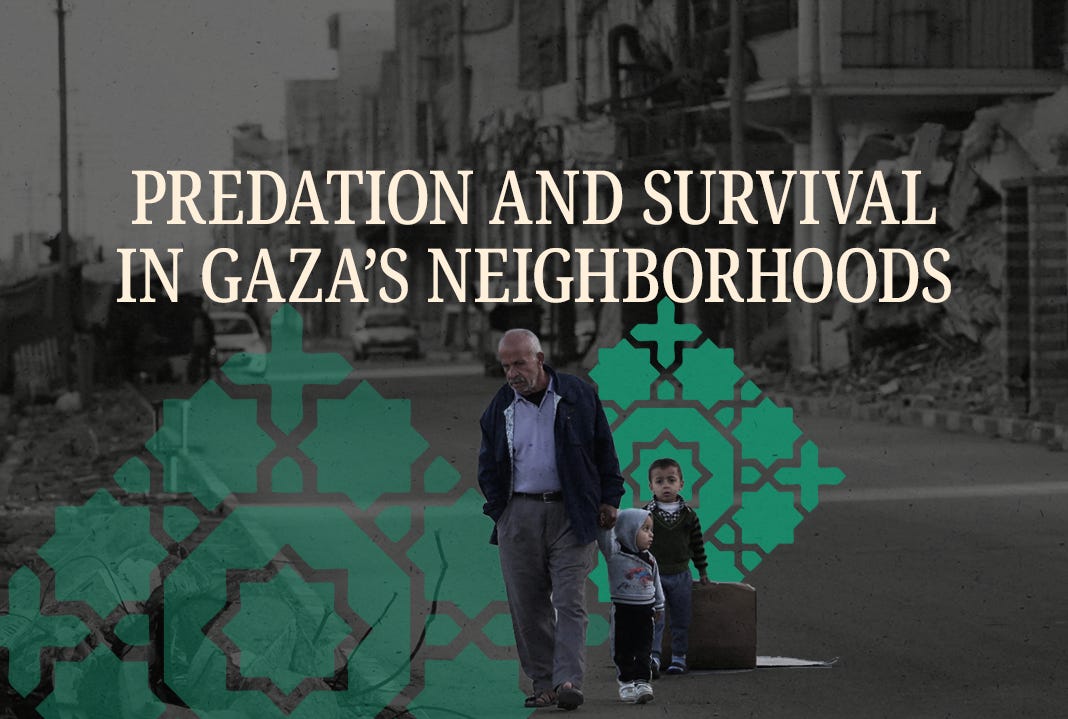Predation and Survival in Gaza’s Neighborhoods
Gaza’s fragile social contract still holds neighborhoods together, offering rare civic harmony in the absence of law and order. But predatory networks and weak authority threaten to tear it apart.
The streets are tense in Khan Younis, southern Gaza. Aid convoys pass under armed escort, while civilians watch helplessly. “The situation here is catastrophic,” said Hassan, a local resident. “Family disputes, daylight theft of aid and personal property, the people need someone to protect them—Arab forces or Palestinian Authority police.” Outside forces, not Hamas or local councils, dictate access to water, food, and medicine. Intelligence on convoy schedules originates from beyond the Strip, granting criminal networks the power to extort and intimidate, thereby bypassing the tenuous social bonds that once held neighborhoods together.
Mariam El-Kurd’s family in Rafah felt the reach of this predation in July 2025. When her 16-year-old son refused recruitment into a criminal network, his arm was deliberately broken—a warning that spread fear throughout the neighborhood. Agencies transporting aid often pay thousands of dollars per truck to pass through areas nominally under Israeli control. Community leaders who attempt to provide protection risk being labeled “Hamas-affiliated,” making leadership a potentially lethal role.
Khaled, a resident of central Gaza, described the creeping pressures in his district: “Even in our neighborhood, people try to help each other, but extortion and theft are constant. You never know who is watching, and anyone who steps up risks becoming a target.” His account shows how communities must constantly balance survival with the threat of predatory violence.
Despite these strains, some neighborhoods manage to preserve a measure of order. Northern districts, facing hunger and water shortages, organize mutual aid. Central areas like where Khaled lives adapt to extortion while maintaining traditional cooperation. The south, however, sees systematic interference targeting leadership, making everyday life unpredictable and increasingly dangerous.
"Gaza still maintains a kind of social contract among its residents, and that is the only thing preventing complete security collapse," said Kareem Joda. "In the heart of ordinary neighborhoods, the street governs itself through an informal social contract, balancing chaos and disorder and keeping society functioning under harsh conditions."
Ashraf Afifi, another Gazan resident, described the erosion of order in even harsher terms:
"Gaza today has become a fertile ground for crime. Not a single day passes without a robbery or a murder. From gangs looting aid to ordinary disputes settled with weapons, everything reflects the absence of law. Restoring legitimate authority is not optional—it is the starting point for Gaza’s future."
Afifi also pointed to the contested question of who could realistically provide such authority. In his view, armed factions lack credibility, Arab forces would be perceived as external actors, and Israel’s presence cannot provide sustainable stability. “Empowering the Palestinian Authority in Gaza? That is what everything should revolve around,” he said.
The capacity to cope is reaching its edge. Hamas retains only splintered and unorganized units, enforcing arbitrary punishment, hoarding aid for themselves, and competing with criminal networks. Without professional support embedded in local structures, new militias could emerge, neighborhoods could further divide, and another October 7-style attack could become possible. Violence, smuggling, and unregulated crossings also threaten to spill into Egypt’s Sinai, creating a real risk for a broader regional security crisis.
Gaza faces risks similar to those seen in Iraq after the 2003 collapse of state authority. The vacuum allowed militias, criminal networks, and sectarian groups to consolidate power. Neighborhoods dismantled, armed actors exploited humanitarian gaps, and instability spilled across borders. Gaza now faces a comparable trajectory: absent professional and locally integrated security, predatory networks could permanently erode social cohesion, encourage new militias to form, and generate more cross-border threats.
In response, Egypt has begun training hundreds of Palestinian Authority security personnel for deployment in Gaza. Officers are instructed to work with neighborhood structures, not replace them. They would investigate predatory networks, safeguard aid convoys, and counter external interference, reinforcing the informal social contracts that allow neighborhoods to function.
Despite harrowing conditions, some communities still organize at the local level. Residents coordinate discreet forms of protection, work to rebuild trust, and maintain basic solidarity in daily life. Amina Qasemi, a 22-year-old student displaced from Gaza City, said: "Even now, people here are trying to rebuild trust with each other. Maybe that’s the first step."
The future of Gaza hinges on whether such precarious systems can be reinforced. Effective, locally integrated security could stabilize neighborhoods, prevent the rise of new militias, and reduce the risk of large-scale attacks overflowing into Sinai. Without action, predatory networks will erode social cohesion, destabilize communities, and create a broader regional crisis.
In Gaza, daily life continues not because of institutions but because of the unspoken agreements and unwritten rules that bind neighbors together. These social contracts have allowed families to endure war, deprivation, and the collapse of formal authority. Yet they are under constant strain. As predatory networks expand and lawlessness deepens, the risk is that even these last sources of order will give way. What remains of Gaza’s social fabric could be pulled apart, leaving communities exposed to violence and exploitation with consequences that reach far beyond the Strip.
Middle East Uncovered is powered by Ideas Beyond Borders. The views expressed in Middle East Uncovered are those of the authors and do not necessarily reflect the views of Ideas Beyond Borders.





This idea of the social fabric or social cohesion is often not explored, but is really the basis for any long-term solution.
With societal collapse, competing armed clans and a splintered Hamas, what is certain is that this cannot produce another Oct 7 attack.